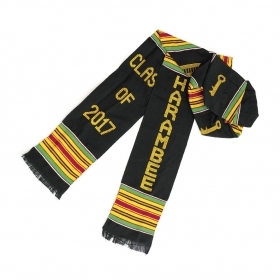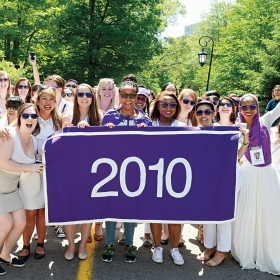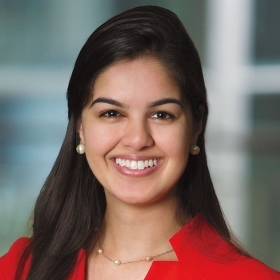This spring, more than 400 alumnae were eager to chip in for graduation stoles for seniors of African and Asian descent, as well as for those who identify as Latinx or LGBTQ+. At $40 a pop, this popular piece of commencement garb can sometimes be a little out of reach, so alumnae have made it possible for 402 students to proudly represent their identity groups when they celebrate in June.
But the College got something out of it, too: Those donors who were from the classes of 2002 to 2017 are helping put Wellesley on the path to earning $1 million from the Schuler Education Foundation, an Illinois-based nonprofit focused on the future of liberal arts education.

Recent Graduates: What We’ve Learned enlarge.
The stole campaign was dreamed up three years ago by Marisa Shariatdoust ’09, who at the time was associate director of the Wellesley Fund, to engage young alumnae in giving as part of a challenge from the Schuler Foundation. In the last three decades, the foundation had noted, overall giving has been declining at colleges and universities across the nation, with the drop tied to lower giving rates among younger alumni. (At Wellesley, this group, currently defined as the classes of ’02 to ’17, accounts for roughly a third of all alumnae.) So Schuler invited five colleges—Bates, Carleton, Middlebury, Wellesley, and Williams—to take part in a three-year initiative to learn more about this age cohort and to develop innovative ways to engage them in philanthropy, thereby building a secure footing for liberal arts institutions. Engaging first-generation and alumnae of color is a priority for the College, and the stole campaign is one example of how it is working to connect them more deeply with Wellesley.
The Wellesley Fund also sponsored the Marathon Monday giving competition, a fund drive that offered pins of res halls, educational events about philanthropy and the College’s endowment, and targeted appeals for younger donors. The efforts were a success: Of the five colleges, Wellesley had the highest increase in donors over $20 in the recent-graduate cohort—a whopping 85%.
This year, the foundation has offered a new challenge: Retain 75% of the young donors from the last two years and earn $1 million. Efforts were underway to reach that goal as this magazine went to press. The buzzer for the end of the challenge sounds on June 30.









We ask that those who engage in Wellesley magazine's online community act with honesty, integrity, and respect. (Remember the honor code, alums?) We reserve the right to remove comments by impersonators or comments that are not civil and relevant to the subject at hand. By posting here, you are permitting Wellesley magazine to edit and republish your comment in all media. Please remember that all posts are public.